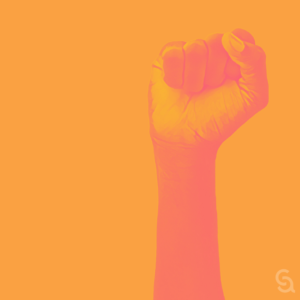
Originally published Sep 8, 2022
“I hate Trump,” I blurted out to a friend who was complaining about how emotional politics had become in recent days. We were socially distanced on lawn chairs in my driveway for this conversation, but—despite my best efforts—I could not distance myself emotionally. I wanted to summon my most persuasive arguments since he was an undecided voter, but I struggled to hide my exasperation at his indifference. My heart was pounding faster and faster and my face was flushing pink.
It did not occur to me then that politics have become so “emotional” because many of us are being triggered by our trauma. Authoritarian leaders are preying upon our pain and using it against us: either to create trauma bonds so we remain unquestioningly loyal to them or to retraumatize us so we are immobilized and powerless to stop them. In either case, our bodies are perceiving danger, and our nervous systems are getting stuck in dysregulated states where we have no capacity for calm, connected, reasonable conversations.
As a survivor of narcissistic abuse, my body recognized the re-traumatizing threat of Trump’s tyranny before my mind was able to name it. I did not know then that denying, attacking, and reversing victim and offender (a gaslighting strategy) could be employed beyond the interpersonal to the national level. But I did recognize the mental vertigo of being told that what I witnessed did not, in fact, happen. I also recognized the gutting betrayal of enablers.
Voting Trump out of office was a chance for my indifferent or previously Trump-supporting friends to declare, “This behavior is unacceptable”—the very thing I needed to hear to leave an abusive relationship as a teenager. Yet some continued to ignore or excuse his actions even after his violent mob ransacked the US Capitol. I have since wondered if there was more going on beneath the surface. Could a history of unprocessed trauma be at the root of why so many tied their identities to Trump and isolated themselves from anything that might contradict their desired realities? Or how seamlessly they perpetuated his same tactics?
Perhaps Trump’s mirroring of their ideals, referencing “good times” of the past, and making future promises tapped into their fear of change and locked in their loyalty. Perhaps his simplistic slogans and “strong-man” leadership style felt good (or, at the very least, familiar) because it’s how they’ve experienced family, work, or church. Perhaps they’ve existed in cycles of abuse for so long that they’re desensitized or hormonally addicted to the roller coaster of emotions. As Marney White explains, “People who experienced abuse in childhood often feel drawn to similar relationships in adulthood, since the brain already recognizes the highs and lows of the cycle.” Perhaps Trump’s hold on them was like that of a trauma bond between a cult leader and his victims, with emotional attachment fueling their compulsion to minimize or justify his actions. “Abuse amnesia” is one way victims cope, blocking out traumatic events to create a false sense of peace. Haven’t we seen denial and self-deception persist among Trump’s base, despite his obvious betrayal?
I broke up with one of my best friends of 15+ years because of “irreconcilable political views,” but that’s not the full story. My body was perceiving danger in every conversation with her. I was being triggered into the dysregulated and dissociated states that I came to know through trauma. This time, though, I could differentiate the source of the toxicity. In the words of K.J. Ramsey, “There wasn’t anything wrong with me. There was wrong happening to me.” I was able to notice the stress hormones pumping through my veins in extreme doses. I instinctively kept records of our conversations so that when she responded with “I never said that” I would have proof—if only for myself. I utilized tools like mindful breathing, grounding in nature, embodied movement, and co-regulating relationships to find my way through the brain chaos—firmly holding onto myself and what I knew to be true along the way. When all this failed to provide a sustainable path forward, I felt guilt and sadness in equal measure for deciding on a clean break.
I’ve continued to wonder how two people who once had everything in common could have had such opposing reactions to Trump. The best explanation I’ve found so far is the different ways we’ve dealt with past pain. Or more broadly, the different kinds of relationships we’ve cultivated with our emotions and nervous systems. As Resmaa Menakem explains, “Clean pain is pain that mends and can build your capacity for growth…dirty pain is the pain of avoidance, blame, or denial—when you respond from your most wounded parts.”
While her pain showed up in how she prided herself on being cold and emotionally detached in our conversations, mine showed up in how I honored vulnerability and befriended my hurt. While her pain punched me in the brain with logical fallacies and attacked my character, mine took time away to regulate and not respond out of anger. Having metabolized the abuse of my past, I was able to name “this behavior is unacceptable” without being unkind. And I was able to realize it was in my power and best interest to walk away from what no longer felt like friendship.
A clean break from Trump was a necessary first step toward relief and release for those of us whose bodies were in a constant state of hyper-vigilance with him as “commander and chief.” But without accountability, Trump’s legacy lives on as reassurance to all abusers everywhere. It affirms that predatory behaviors will be tolerated if only you have enough power, influence, or money to evade culpability and consequence. Many of us already know this is how the world works because we have been worked by it. Our silence and forgiveness have been exploited enough times that we know how empowering it is to honestly name our feelings—to say “I hate him” aloud. But the subtext I wish I could have articulated to my friend on the lawn chair that day was this: Please believe me. Please don’t enable this abuser. Please don’t let him get away with it.
It may seem like there isn’t much you or I can do to influence the Department of Justice to convict Trump, but we’re not powerless. We can do the work of exposing and divesting from systems of abuse right where we are. Resmaa Menakem writes, “By refusing to pass on the trauma we inherited, we help heal the world.” We can begin by noticing the reactions of our nervous system in real-time. We can honor the pain of our past and tend to our emotions with curiosity instead of judgment. We can invest in relationships where we feel safe and create safe spaces for others. We can normalize believing survivors and holding abusers accountable. Whoever they are—best friend or the POTUS—we don’t have to let the unacceptable remain unaccountable.
We may not be able to escape our pain, but we can learn to move through it. It just might be the key to healing the world.
 Felicia Melian is a seminary graduate, ordained minister, and ex-church planter turned writer, researcher, and aspiring public theologian. She specializes in interrogating the invisible, stagnant, and harmful ideas that exist among white evangelicals, especially those that stand in the way of justice.
Felicia Melian is a seminary graduate, ordained minister, and ex-church planter turned writer, researcher, and aspiring public theologian. She specializes in interrogating the invisible, stagnant, and harmful ideas that exist among white evangelicals, especially those that stand in the way of justice.


